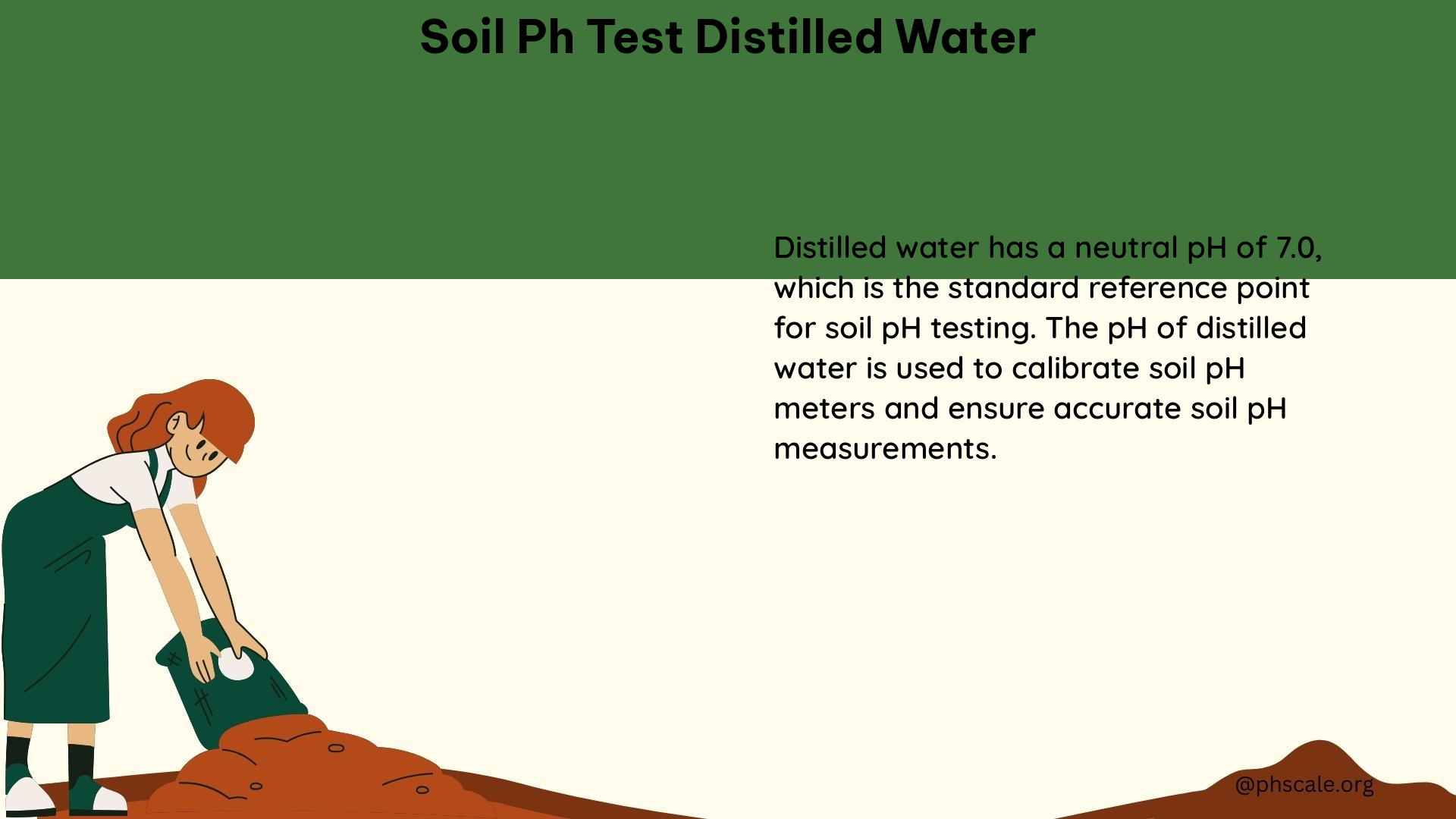Soil pH testing is a crucial step in understanding the acidity or alkalinity of your soil, which directly impacts the growth and health of your plants. When it comes to soil pH testing, using distilled water is the preferred method to ensure accurate results. In this comprehensive blog post, we’ll explore the importance of using distilled water, the process of conducting a soil pH test, and the significance of maintaining the right soil pH balance.
Why Distilled Water is Essential for Soil pH Testing
Distilled water is the preferred choice for soil pH testing because it has a neutral pH and does not contain any contaminants or substances that could affect the pH reading of the soil. Tap water, on the other hand, may contain dissolved salts, minerals, and other impurities that can alter the pH reading, leading to inaccurate results.
Using distilled water ensures that the pH reading is solely a reflection of the soil’s acidity or alkalinity, without any external factors influencing the measurement. This is crucial for making informed decisions about soil amendments and plant selection based on the soil’s pH.
Can Tap Water be Used Instead of Distilled Water?

While it is possible to use tap water for soil pH testing, it is not recommended. Tap water can contain a variety of impurities, such as minerals, chlorine, and other substances, that can affect the pH reading. These contaminants can either increase or decrease the soil’s pH, leading to inaccurate results.
If distilled water is not readily available, boiled rainwater can be used as an alternative. However, it is essential to ensure that the water is free from any impurities that could impact the pH measurement.
How to Conduct a Soil pH Test Using Distilled Water
There are two common methods for conducting a soil pH test using distilled water:
- Slurry Method:
- Mix 1-1.5 ml of distilled water with 1 gram of soil.
- Stir the mixture well and let it settle for at least an hour.
-
Stir the mixture again and measure the pH using a pH meter.
-
Direct Soil Testing:
- Poke holes in the ground and add distilled water to dampen the soil.
- Insert a pH meter directly into the soil and take the reading.
It’s important to follow the instructions carefully and ensure that the pH meter is properly calibrated to obtain accurate results.
The Importance of Distilled Water in Soil pH Testing
Using distilled water in soil pH testing is crucial for several reasons:
-
Neutral pH: Distilled water has a neutral pH, which means it does not contribute to the pH reading of the soil. This ensures that the pH measurement is a true reflection of the soil’s acidity or alkalinity.
-
Absence of Contaminants: Distilled water is free from any impurities or substances that could affect the pH reading. This eliminates the risk of inaccurate results due to external factors.
-
Accurate Measurement: By using distilled water, you can accurately measure the soil’s pH and buffer capacity, which is essential for making informed decisions about soil amendments and plant selection.
Dealing with Contaminants in Soil pH Testing
To ensure accurate soil pH testing, it’s important to address any potential contaminants in the soil or water used for the test. Here are some steps to take:
-
Use Distilled or Boiled Rainwater: As mentioned earlier, distilled water or boiled rainwater is the best choice to minimize the impact of impurities.
-
Follow Proper Testing Procedures: Adhere to the recommended methods for soil pH testing, such as the slurry method or direct soil testing, to minimize errors and ensure reliable results.
-
Calibrate pH Meter: Regularly calibrate your pH meter to ensure it is providing accurate readings.
-
Repeat Measurements: Consider taking multiple measurements to verify the consistency of the results and identify any potential outliers.
Ideal Soil pH Range for Plant Growth
For most plants, a soil pH range of 6.0 to 7.0 is generally considered suitable. However, the ideal pH range may vary depending on the specific plant species and soil type. It’s essential to test the soil pH regularly and make adjustments as needed to maintain the optimal pH for your plants.
Balancing Soil pH
If the soil pH is not within the ideal range, you can take steps to adjust it:
- To raise the pH and make the soil less acidic, you can add lime (calcium carbonate) to the soil.
- To lower the pH and make the soil more acidic, you can add elemental sulfur or aluminum sulfate to the soil.
It’s important to follow the recommended application rates and monitor the soil pH over time to ensure the desired balance is achieved.
History of Soil pH Testing
Soil pH testing has been a fundamental practice in agriculture and horticulture for centuries. The concept of pH was first introduced by Søren Sørensen in 1909, and since then, various methods have been developed to measure soil pH, including the use of distilled water.
Over the years, the importance of using distilled water in soil pH testing has been recognized, as it helps to eliminate the influence of external factors and provide accurate results.
References
- Reddit: Can I calibrate tap water to use for soil pH tests (with test strips)? (2023)
- Biology Stack Exchange: Alternative to distilled water for pH test (2017)
- Aptus Holland: Testing Ph In Your Soil (2019)
- Instrument Choice: Measuring soil pH using a soil/water mix (n.d.)
- Houzz: if distilled water isn’t pH neutral, how to measure soil pH? (2013)
